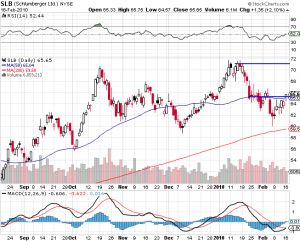Technical and Fundamental Analysis
Making stock trading decisions is a process that requires research, diligence, and weighing the potential outcomes of that decision. Investors use techniques of fundamental analysis and technical analysis to make the best stock trading decisions possible. Before we talk about which we prefer at IYMN, lets figure out exactly what each of these schools of thought are.
Technical Analysis
Technical Analysis traders evaluate securities by analyzing statistics generated by market activity such as past price and volume. Instead of focusing on intrinsic value, technical analysis traders use charts (like the one below) to identify patterns that may predict future activity. There are three major assumptions to technical analysis you need to know about.
“The Market Discounts Everything” implies that price can be heavily influenced by investors perception of supply and demand. Technical Analysts believe it can be assumed the current market price of a stock reflects all the important information that fundamental analysts (who we’ll talk more about in a sec) are seeking to provide data for. Technical analysts focus on what the market is valuing the stock at.
- Price Moves In Trends
There are three type of trends; uptrends, downtrends, and horizontal trends. When you look at a stock chart, you’ll see that the chart, almost always, moves in a wave like pattern. It will rise, fall, rise, fall, rise, fall etc..Technical analysts maintain that once a trend has established it will continue to behave the same way in the future.
- History Repeats Itself
We humans are very predictable creatures, and yes history repeats itself applies to more than just traditional “history” lessons. As it applies to stock investing; people will generally react consistently given a consistent market climate.
Technical Analysis Is A Complex Trading Strategy
It requires some serious research, a great deal of persistence, and some quality brain power. Technical Analysts apply the history of the stock pattern to their future buying habits; its a bit abstract and can be difficult to really grasp unless you have really put in the time.
Learn More (Way More) About Technical Analysis
Fundamental Analysis
Fundamental Analysis: A method of evaluating a security by measuring its intrinsic value by examining economic, financial, and other quantitative factors.
Fundamental Analysts tend to think “bigger picture” as opposed to technical analysts; they study everything that can affect a securities value. Fundamentalists may refer to their technical counterparts as narrow minded or lacking in creativity.
So remember, Fundamental Analysts like to evaluate everything, whats everything? Here are a few examples.
- Profit Margins
- Upper Management | Leadership
- Potential for Growth
- Business Model
- PR (political situation, scandals, any detrimental press)
Some of the content on this site is derived from a more fundamental approach. My personal favorite aspect to analyze are the future prospects of the company.
Why Use Fundamental Analysis?
Because sometimes the stock market prices a company wrong. If a company has a strong business model, positive brand image, is experiencing stable growth, remaining profitable, and seems to have a bright future; its usually a good investment. Even if the stock may be undervalued or misrepresented.
I wrote a piece on Tesla Stock Price and recommended picking up $tsla stock solely because of the future prospects and health of the business. No one would have thought Tesla would dig itself out of the hole it was in a few years ago; many technical analysts would have laughed at purchasing Tesla stock because of the awful history of its performance.
If you were to examine other factors like upper management; in this case a brilliant CEO Elon Musk and future prospects; electric cars gaining more and more popularity, buying stock in Tesla does not seem anywhere near as absurd.
Pick What Works For You
Warren Buffet is a fundamental analyst; he applied some of these very same strategies we talked about to his stock purchasing behavior and it made him a billionaire. While not everyone…well really almost no one, will be as successful using fundamental analysis as Warren Buffet, it does go to show you that these strategies work.
James Simon is a technical analyst; another billionaire, who studied math at MIT. Known as the “Quant King”, using technical analysis has helped to make him the eighty second richest man in the world.
Point is, either one of these strategies will work. Personally I like to evaluate securities fundamentally. Not only because I think it works, but because its more engaging. I am not exactly a “numbers guy” and analyzing fundamentally allows me to evaluate with factors other than just number crunching.

No Comments »
No comments yet.
Leave a comment